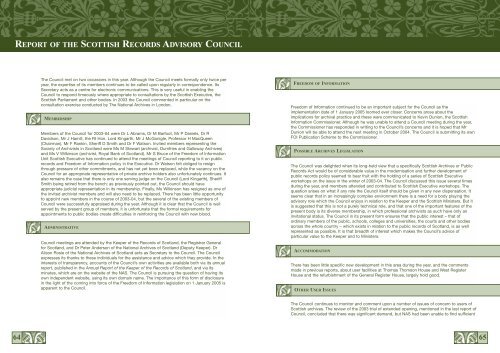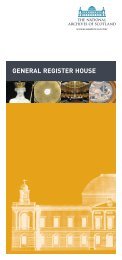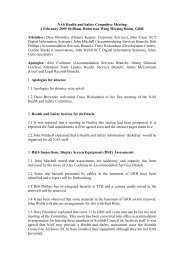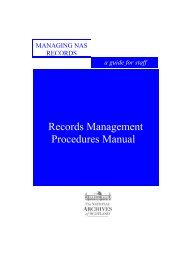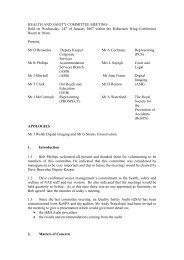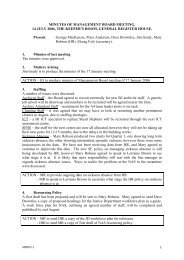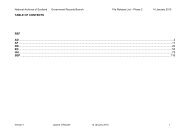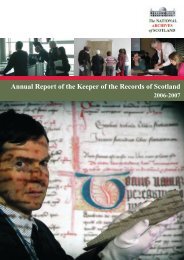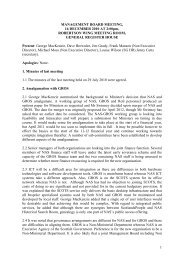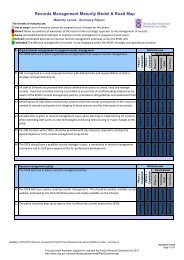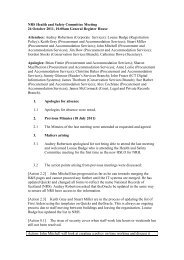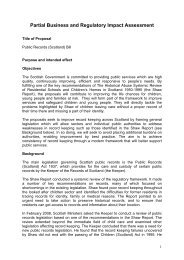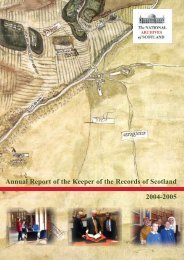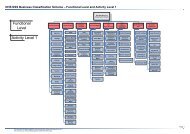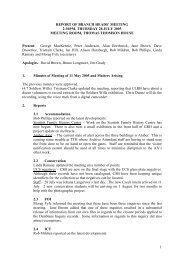Annual Report 2003-2004 - National Archives of Scotland
Annual Report 2003-2004 - National Archives of Scotland
Annual Report 2003-2004 - National Archives of Scotland
Create successful ePaper yourself
Turn your PDF publications into a flip-book with our unique Google optimized e-Paper software.
REPORT OF THE SCOTTISH RECORDS ADVISORY COUNCIL<br />
The Council met on two occasions in this year. Although the Council meets formally only twice per<br />
year, the expertise <strong>of</strong> its members continues to be called upon regularly in correspondence. Its<br />
Secretary acts as a centre for electronic communications. This is very useful in enabling the<br />
Council to respond timeously where appropriate to consultations by the Scottish Executive, the<br />
Scottish Parliament and other bodies. In <strong>2003</strong> the Council commented in particular on the<br />
consultation exercise conducted by The <strong>National</strong> <strong>Archives</strong> in London.<br />
MEMBERSHIP<br />
Members <strong>of</strong> the Council for <strong>2003</strong>-04 were Dr L Abrams, Dr M Barfoot, Mr P Daniels, Dr R<br />
Davidson, Mr J Hamill, the Rt Hon. Lord Kingarth, Mr J McGonigle, Pr<strong>of</strong>essor H MacQueen<br />
(Chairman), Mr F Rankin, Sheriff D Smith and Dr F Watson. Invited members representing the<br />
Society <strong>of</strong> Archivists in <strong>Scotland</strong> were Ms M Stewart (archivist, Dumfries and Galloway <strong>Archives</strong>)<br />
and Ms V Wilkinson (archivist, Royal Bank <strong>of</strong> <strong>Scotland</strong>). Mr S Bruce <strong>of</strong> the Freedom <strong>of</strong> Information<br />
Unit Scottish Executive has continued to attend the meetings <strong>of</strong> Council reporting to it on public<br />
records and Freedom <strong>of</strong> Information policy in the Executive. Dr Watson felt obliged to resign<br />
through pressure <strong>of</strong> other commitments, and has not yet been replaced, while the vacancy on the<br />
Council for an appropriate representative <strong>of</strong> private archive holders also unfortunately continues. It<br />
also remains the case that there is only one serving judge on the Council (Lord Kingarth), Sheriff<br />
Smith being retired from the bench; as previously pointed out, the Council should have<br />
appropriate judicial representation in its membership. Finally, Ms Wilkinson has resigned as one <strong>of</strong><br />
the invited archivist members and will also need to be replaced. There has been little opportunity<br />
to appoint new members in the course <strong>of</strong> <strong>2003</strong>-04, but the several <strong>of</strong> the existing members <strong>of</strong><br />
Council were successfully appraised during the year. Although it is clear that the Council is well<br />
served by the present group <strong>of</strong> members, it is unfortunate that the formal requirements for<br />
appointments to public bodies create difficulties in reinforcing the Council with new blood.<br />
ADMINISTRATIVE<br />
Council meetings are attended by the Keeper <strong>of</strong> the Records <strong>of</strong> <strong>Scotland</strong>, the Registrar General<br />
for <strong>Scotland</strong>, and Dr Peter Anderson <strong>of</strong> the <strong>National</strong> <strong>Archives</strong> <strong>of</strong> <strong>Scotland</strong> (Deputy Keeper). Dr<br />
Alison Rosie <strong>of</strong> the <strong>National</strong> <strong>Archives</strong> <strong>of</strong> <strong>Scotland</strong> acts as Secretary to the Council. The Council<br />
expresses its thanks to these individuals for the assistance and advice which they provide. In the<br />
interests <strong>of</strong> transparency, accounts <strong>of</strong> the Council’s own activities are available both via its annual<br />
report, published in the <strong>Annual</strong> <strong>Report</strong> <strong>of</strong> the Keeper <strong>of</strong> the Records <strong>of</strong> <strong>Scotland</strong>, and via its<br />
minutes, which are on the website <strong>of</strong> the NAS. The Council is pursuing the question <strong>of</strong> having its<br />
own independent website, using its own domain name. The importance <strong>of</strong> this form <strong>of</strong> disclosure<br />
in the light <strong>of</strong> the coming into force <strong>of</strong> the Freedom <strong>of</strong> Information legislation on 1 January 2005 is<br />
apparent to the Council.<br />
FREEDOM OF INFORMATION<br />
Freedom <strong>of</strong> Information continued to be an important subject for the Council as the<br />
implementation date <strong>of</strong> 1 January 2005 loomed ever closer. Concerns arose about the<br />
implications for archival practice and these were communicated to Kevin Dunion, the Scottish<br />
Information Commissioner. Although he was unable to attend a Council meeting during the year,<br />
the Commissioner has responded in writing to the Council’s concerns and it is hoped that Mr<br />
Dunion will be able to attend the next meeting in October <strong>2004</strong>. The Council is submitting its own<br />
FOI Publication Scheme to the Commissioner.<br />
POSSIBLE ARCHIVES LEGISLATION<br />
The Council was delighted when its long-held view that a specifically Scottish <strong>Archives</strong> or Public<br />
Records Act would be <strong>of</strong> considerable value in the modernisation and further development <strong>of</strong><br />
public records policy seemed to bear fruit with the holding <strong>of</strong> a series <strong>of</strong> Scottish Executive<br />
workshops on the issue in the winter <strong>of</strong> <strong>2003</strong>-04. The Council discussed this issue several times<br />
during the year, and members attended and contributed to Scottish Executive workshops. The<br />
question arises on what if any role the Council itself should be given in any new dispensation. It<br />
seems clear that in an increasingly complex environment there is a need for a body playing the<br />
advisory role which the Council enjoys in relation to the Keeper and the Scottish Ministers. But it<br />
is suggested that this is not a purely technical role, and that one <strong>of</strong> the important features <strong>of</strong> the<br />
present body is its diverse membership, in which pr<strong>of</strong>essional archivists as such have only an<br />
invitational status. The Council in its present form ensures that the public interest – that <strong>of</strong><br />
ordinary members <strong>of</strong> the public, schools, colleges and universities, the courts and other bodies<br />
across the whole country – which exists in relation to the public records <strong>of</strong> <strong>Scotland</strong>, is as well<br />
represented as possible. It is that breadth <strong>of</strong> interest which makes the Council’s advice <strong>of</strong><br />
particular value to the Keeper and to Ministers.<br />
ACCOMMODATION<br />
There has been little specific new development in this area during the year, and the comments<br />
made in previous reports, about user facilities at Thomas Thomson House and West Register<br />
House and the refurbishment <strong>of</strong> the General Register House, largely hold good.<br />
OTHER USER ISSUES<br />
The Council continues to monitor and comment upon a number <strong>of</strong> issues <strong>of</strong> concern to users <strong>of</strong><br />
Scottish archives. The review <strong>of</strong> the <strong>2003</strong> trial <strong>of</strong> extended opening, mentioned in the last report <strong>of</strong><br />
Council, concluded that there was significant demand, but NAS had been unable to find sufficient<br />
64<br />
65


